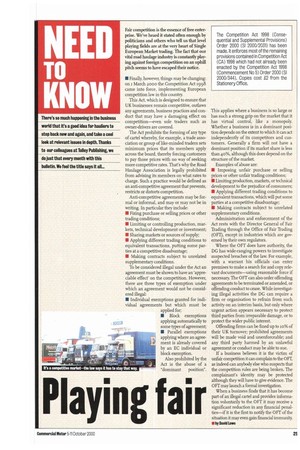Playing fair
Page 29

If you've noticed an error in this article please click here to report it so we can fix it.
Fair competition is the essence of free enterprise. We've heard it stated often enough by politicians and others who tell us that level playing fields are at the very heart of Single European Market trading. The fact that our vital road haulage industry is constantly playing against foreign competition on an uphill pitch seems to have escaped their notice.
• Finally, however, things may be changing: on I March 2000 the Competition Act 1998 came into force, implementing European competition law in this country.
This Act, which is designed to ensure that UK businesses remain competitive, outlaws any agreements, business practices and conduct that may have a damaging effect on competition—even sole traders such as owner-drivers are covered.
The Act prohibits the forming of any type of cartel whereby, for example, a trade association or group of like-minded traders sets minimum prices that its members apply across the board, thereby forcing customers to pay those prices with no way of seeking more competitive rates. That's why the Road Haulage Association is legally prohibited from advising its members on what rates to charge. Such a practice would be defined as an anti-competitive agreement that prevents, restricts or distorts competition.
Anti-competitive agreements may be formal or informal, and may or may not be in writing. In particular they include: • Fixing purchase or selling prices or other trading conditions; • Limiting or controlling production, markets, technical development or investment; • Sharing markets or sources of supply; • Applying different trading conditions to equivalent transactions, putting some parties at a competitive disadvantage; • Making contracts subject to unrelated supplementary conditions.
To be considered illegal under the Act an agreement must be shown to have an 'appreciable effect' on the competition. However, there are three types of exemption under which an agreement would not be considered illegal: • Individual exemptions granted for individual agreements but which must be applied for; • Block exemptions applying automatically to some types of agreement.;
• Parallel exemptions „, applying where an agree/ ment is already covered by an EC individual or block exemption.
Also prohibited by the Act is the abuse of a "dominant position". This applies where a business is so large or has such a strong grip on the market that it has virtual control, like a monopoly. Whether a business is in a dominant position depends on the extent to which it can act independently of its competitors and customers. Generally a firm will not have a dominant position Wits market share is less than 40%, although this does depend on the structure of the market.
Examples of abuse are: • Imposing unfair purchase or selling prices or other unfair trading conditions; • Limiting production, markets, or technical development to the prejudice of consumers; • Applying different trading conditions to equivalent transactions, which will put some parties at a competitive disadvantage; • Making contracts subject to unrelated supplementary conditions.
Administration and enforcement of the Act rests with the Director General of Fair Trading through the Office of Fair Trading (OFT), except in industries which are governed by their own regulators.
Where the OFT does have authority, the DG has wide-ranging powers to investigate suspected breaches of the law. For example, with a warrant his officials can enter premises to make a search for and copy relevant documents—using reasonable force if necessary. The OFT can also order offending agreements to be terminated or amended, or offending conduct to cease. While investigating illegal activities the DC can require a firm or organisation to refrain from such activity on an interim basis, but only where urgent action appears necessary to protect third parties from irreparable damage, or to protect the wider public interest.
Offending firms can be fined up to io% of their UK turnover; prohibited agreements will be made void and unenforceable; and any third party harmed by an unlawful agreement or conduct may be able to sue.
If a business believes it is the victim of unfair competition it can complain to the OFT as indeed can anybody else who suspects that the competition rules are being broken. The complainant's identity may be protected although they will have to give evidence. The OFT may launch a formal investigation.
When a business finds that it has become part of an illegal cartel and provides information voluntarily to the OFT it may receive a significant reduction in any financial penalties—if it is the first to notify the OFT of the situation it may even gain financial immunity.
• by David Lowe
















































































































